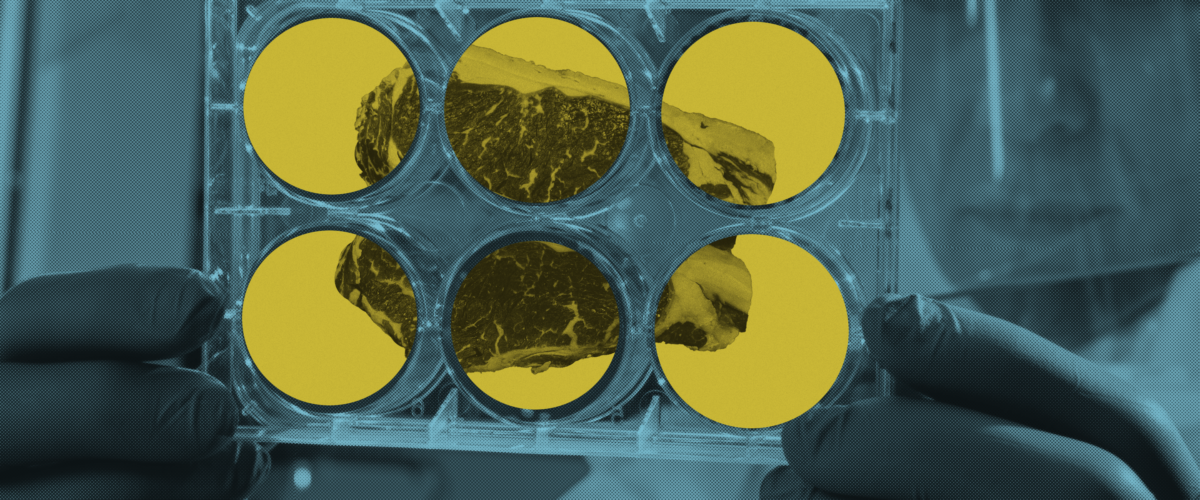Are We Really About to Start Eating Lab Meat?!
Published Dec 5, 2022

Stories about the FDA’s “approval” of lab meat remind us that overhyped tech fixes fall far short of actually fixing our food system.
If you’ve scanned the headlines recently, you might have thought “lab-grown” meat would soon be destined for your dinner table. A company called Upside Foods scored a massive PR triumph, with stories all over the world giving the impression that the Food & Drug Administration (FDA) had deemed their lab meat, also called “cell” or “cultured” meat, “safe for human consumption.”
What the FDA actually did, though, was not so definitive — and it stands as a timely reminder to be skeptical about the quick-fix, cure-all, techno-hype around cultured meat.
This November, Upside Foods — formerly known as Memphis Meats — blasted a press release declaring that it was the “First Company in the World to Receive U.S. FDA ‘Green Light’ for Cultivated Meat.”
But if you dig a little deeper, you’ll find that what the FDA actually did was not so final. The agency simply reviewed data submitted by the company and determined that it had no further questions. As the far more muted FDA press release put it, “The voluntary pre-market consultation is not an approval process.”
The truth is, there are a host of concerns when it comes to lab meat. The production process requires heavy use of antibiotics and hazardous materials. Diseases can spread throughout a facility or into the product during that process. And there are also as yet unknown health and safety risks for humans eating cultured meat.
Lab Meat Hype Doesn’t Live Up to Reality
The idea that we can build massive laboratories that grow animal cells into food sounds like the stuff of science fiction. At this point, it is mostly just that.
“Lab meat” would come from tissue and growth mediums extracted from animals to grow muscle fibers. With chemical additives, the resulting muscle fibers mimic conventional meat.
Tech-happy investors and industry evangelists like to paint a cruelty-free future. In their vision, cultured meat grown in steel vats erases many of the worst aspects of Big Ag, like dangerous slaughterhouses and polluting factory farms. Instead, we’d be fed by laboratories churning out animal protein indistinguishable — or so we’re told — from the “real thing.”
But this is hype that far outpaces reality. Millions of Wall Street dollars have been invested in an array of lab meat start ups. Those startups have regularly promised breakthroughs that have not materialized.
In fact, there remain substantial doubts that lab-grown meat will ever economically compete with conventional meat. For now, there is a single location in the world where you can purchase an order of lab-derived chicken nuggets. It’ll cost you $23 and a plane ticket to Singapore.
Lab Meat Likely Won’t Help Us Stop Climate Change
There’s no denying that factory farms represent a growing threat to climate stability. They’re a significant source of methane emissions, thanks in large part to massive herds that produce liquid manure. That’s why lab meat proponents argue that they can build a cleaner alternative.
But these claims are, at best, speculative. And it’s important to understand that meat giants like Cargill are heavily invested in this industry — precisely because they don’t expect it to “replace” factory farm meat.
What we do know, though, suggests that scaling up production may actually be worse for the climate than the status quo. We are talking about industrialization, after all.
These facilities would require enormous amounts of energy, likely from fossil fuel sources. One study found that mass production of lab meat would have substantial ecological impacts — perhaps even more than livestock farming.
We Don’t Need Tech Cures — We Need a Sustainable Food System
The solution to a food system designed to maximize corporate profits won’t come from a technological fix championed by food corporations and Wall Street investors. And a few new, niche “meat” choices won’t make factory farming disappear.
We can build a more sustainable food system, and that doesn’t require the latest overhyped, “disruptive” innovation. Those innovations just attract Wall Street investors, not transformational change.
To achieve that change, we need to invest in diverse, regional, sustainable agriculture and ban polluting factory farms. We also need to win the political victories at the state and federal levels that will transition us off the factory farm model.
At the same time, we must fight against the corporate powers that have a stranglehold on our food system. That in part means stopping new corporate mega-mergers and reinstating robust supply management policies. These policies will help us nurture regional, diverse, regenerative agriculture.
A just, safe, and sustainable food system doesn’t start or end with a new tactic for corporate profits.
Lab meat won’t fix our food system. Help us cut through the hype!
Enjoyed this article?
Sign up for updates.
TO TOP


